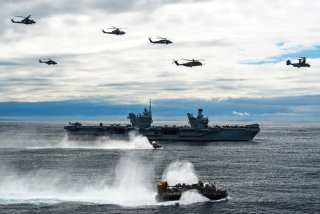Sea Power: “It’s the Economy, Stupid!”
A new book redefines and puts into context the thought of Alfred Thayer Mahan, America's greatest naval theorist.
Nicholas A. Lambert, The Neptune Factor: Alfred Thayer Mahan and the Concept of Sea Power, (Annapolis, U.S. Naval Institute Press). 440 pp., $34.95.
The oceans have always been battlefields since mankind first set sail. As early seafarers plied their trade, it became vulnerable to state and non-state actors. Warships and later navies emerged to deter those offenders and protect legitimate trade. This ensured stability in the provision and exchange of goods and currency. In the past two years alone, maritime security has proved itself no less a problem. In the Russo-Ukrainian War, Kyiv’s Navy sunk, among other ships, the Russian cruiser Moskva. A British warship recently arrived in Guyana as Venezuela threatened its neighbor, desiring its offshore oil. In the Red Sea, U.S. and allied naval vessels counter drone attacks, ballistic missile strikes, and unmanned explosive-laden boats threatening merchant ships. The Chinese military continues to make incursions in and over Taiwan waters, threatening that nation’s sovereignty. In the wake of the United States’ longest two land wars, the media, and the general public are being reminded of the role and importance of the oceans as these incidents and operations continue to escalate.
These events are not isolated. They are part of a general destabilization that can occur without a force—or partnership of like-minded forces—to protect legitimate commerce, deter self-interested and non-state actors, and defeat those who carry out violence on the high seas. Navalists have not been silent. Reports from various think tanks, other organizations, and media have warned of a maritime crisis for years. Their voices echo that of the patron saint of modern navalists, Alfred Thayer Mahan.
In this environment, a timely new book revisits a century-old topic, enlightens readers with previously undiscovered research, and corrects misinterpretations. Nicholas Lambert’s The Neptune Factor: Alfred Thayer Mahan and the Concept of Sea Power. As with his monumental 2021 study, The War Lords and the Gallipoli Disaster: How Globalized Trade Led Britain to Its Worst Defeat of the First World War, Lambert delves into how economics shaped Mahan’s theories, most famously articulated in his classic work The Influence of Sea Power upon History, 1660-1783 (1890). The text heavily influenced domestic and international policymakers at the turn of the century. In reading the entirety of Mahan’s published works and discovering previously buried correspondence, Lambert resurrects the first American navalist in a way that challenges those who venerate him.
Lambert’s book is a work of history but not strictly of naval history and its battles. It is an explanatory history of Mahan’s underlying principles, which were economic in nature. Mahan corresponded with leading economists of the period in exchanges, where he learned as much from them as they did about naval affairs. Mahan, Lambert points out, regarded sea power “as the continuation of economies by other means,” in contrast to military strategist Carl von Clausewitz’s famous maxim that “war is a continuation of policy by other means.” Lambert argues that Mahan’s body of work has been the basis of incorrectly applied lessons where it is easier to invoke his name without necessarily understanding his work. One can claim to be a constitutionalist, but one must read not only the Constitution itself but also The Federalist Papers, which provide essential commentary on it. In the same way, navalists—and those who benefit from a strong navy—ought to read what Mahan wrote. In this case, Lambert can comprehensively present that body of work, some of which has remained hidden in archives.
Early in his book, Lambert clearly states that “the role of the navy is to throttle the enemy’s commerce not just through sea battles but by regulating the international trading system.” Economies are at the core of a strong navy, and combat is only a secondary factor in maintaining or restoring maritime order. Therefore, the purpose of a navy is not necessarily power projection, nor should anticipated combat operations dictate strategy and acquisition. In short, Mahan’s fundamental argument was not “for a larger fleet simply to enhance the status of his institution or out of chest-thumping militarism” but rather to emphasize the sea services’ integral connection to the global economy. The role of a navy was to strangle an enemy’s commerce, not necessarily to destroy its fleet. This challenges the conventional wisdom of Mahan’s ideas and that misrepresentation has led to a contemporary failure of the strategic vision of the role of the Navy and merchant service in support of national goals. To what can we attribute this misconception?
In the nineteenth century, the United States understood the role of the Navy in advancing economic objectives. Without a navy to protect its maritime commerce during George Washington’s administration, the nation was reduced to paying tribute to the Barbary pirates. Even President Andrew Jackson, more famous for his land battles, had a maritime strategy: expand trade, protect commerce, and respond to provocations with naval action only when necessary. Squadron commodores conducted diplomacy on the various global stations. Theodore Roosevelt not only embraced Mahan’s ideas—the latter was familiar enough that he rented Roosevelt’s Washington townhome while Roosevelt left for the war in Cuba—but also implemented them. Like his distant cousin, Franklin Roosevelt understood the service, perhaps like no other president, and was deeply involved in preparing it for the Second World War.
Like Admiral Hyman Rickover, Mahan was one of those few select officers with a policy and public impact outside his wartime experiences. The broader public embraced Mahan, and his books and articles became a sensation. From 1885 to the month before he died in December 1914, Mahan was mentioned in the New York Times, for example, more than 1,700 times. Despite this domestic and international interest in Mahan and his work, the Navy’s leadership often eschewed his ideas or, in the case of one admiral who said that naval officers should not write books. To be fair, he took a similarly dim view of Navy leadership as readers of The Neptune Factor learn.
Lambert states, “the wheel of history has turned back to Mahan; perhaps the Navy should turn with it.” But, if the gospels are correct, no prophet is honored in his native land. Such is the case today as one is more likely to find Mahan on the desks of Chinese admirals than in the United States. In the past decade, China has executed Mahan’s ideas. Outside the U.S. Navy (or even within it), it might be challenging for Mahan’s concepts to take root again. First, Lambert notes that Mahan’s book “fell upon a reading public well-primed to accept a coherent presentation of certain large armies.” But Mahan’s success depended on a public predisposed to actually reading. Today’s citizens receive their news, such as it is, from social media and are otherwise distracted by limitless entertainment options, unlike their nineteenth-century forebears. Fewer students are reading for fun now than a few decades ago. Americans, as a whole, are reading fewer books. Preaching a naval gospel is more difficult when the pews are emptying.
Second, Lambert points out that Mahan “aimed to show how [the U.S.] navy was essential to protecting their essential interest.” Therein lies the challenge in the modern era. The fault is neither with Lambert nor Mahan. Still, it is necessary to recognize that people, individually or collectively, might not be reasoned with to do what is in their interest. For example, the dangers of smoking and addictive drugs are well documented. Yet, individuals will still seek immediate self-gratification contrary to long-term personal and broader interests.
When Somali pirates were striking merchant ships at will in the 2000s, it was reasonable to respond, given the impact on mariners, shipping companies, and insurers. And yet one admiral told shipping companies that the U.S. Navy was limited in protecting them. That changed when the Maersk Alabama was hijacked, generating public support for naval action. This is not new. Public policy is driven more by popular passions than rational deliberation, as acknowledged in The Federalist Papers.

Thus, despite Lambert’s tremendous work on representing and returning Mahan to the public, will its reasoning overcome a shortsighted and splenetic public discourse? Somehow, Mahan was able to communicate key concepts that both the policymakers and the public could understand. He spoke their language. Mahan made the Navy relevant to them, their lives, and why they should have to pay for it. Consequently, “legislators would hold aloft blue-penciled copies of Mahan to hail his wisdom.” This conveyance of a simple idea has not always been easy and, in some cases, has had a counter-effect. Consider the case of England’s former “Ship Money” tax, in which the Crown levied taxes from coastal towns and villages for maritime defense in times of war. Those residents understood the tax because their industries—fishing and merchant trade—were directly affected by enemy ships. However, that changed in the 1630s when King Charles I began levying the tax on the country’s interior, where citizens had less immediate awareness of ships and the oceans, contributing to the English Civil War and the king’s eventual downfall.

